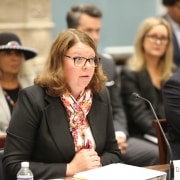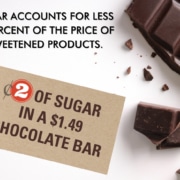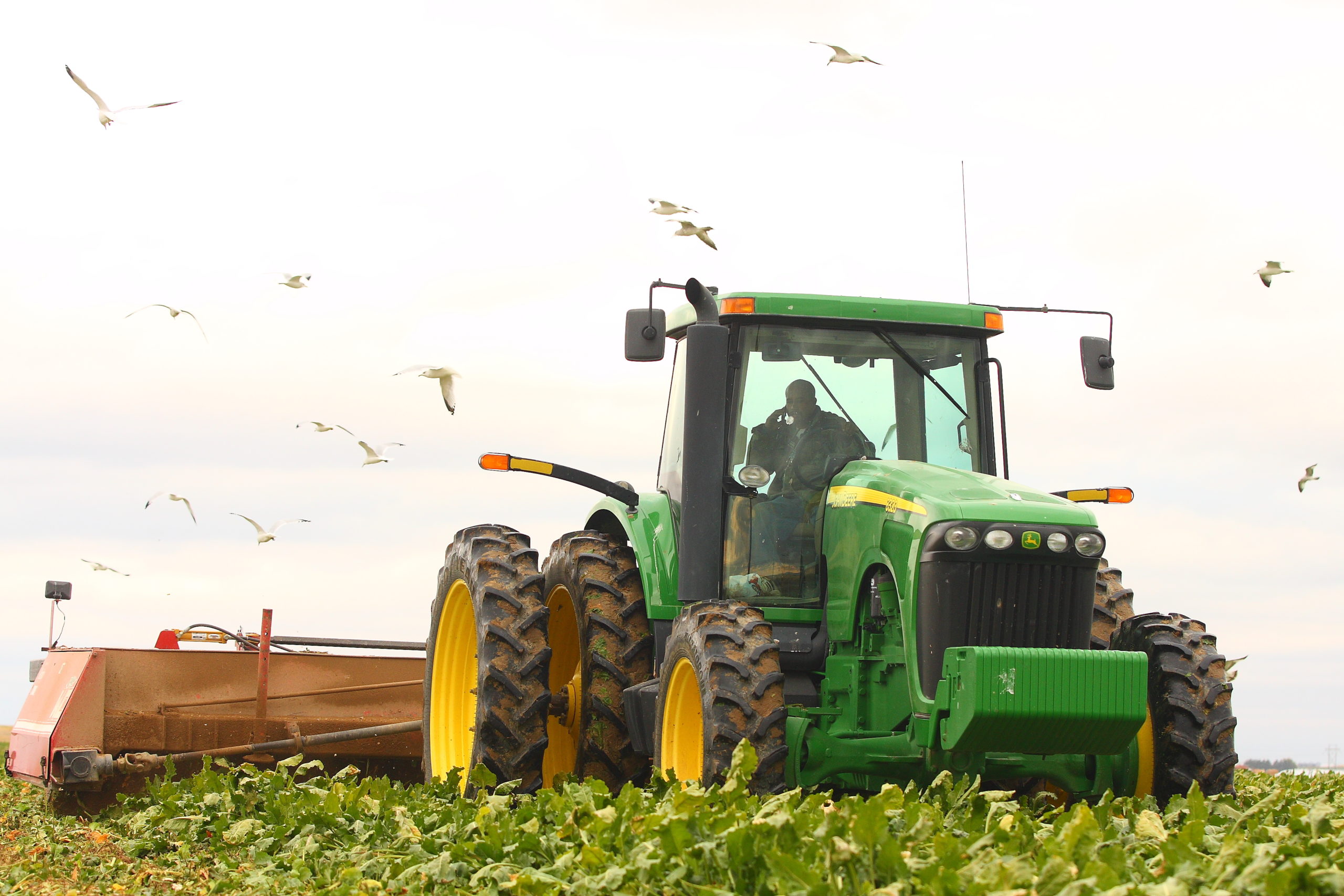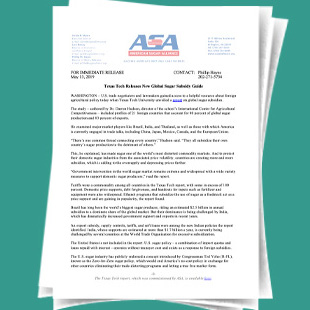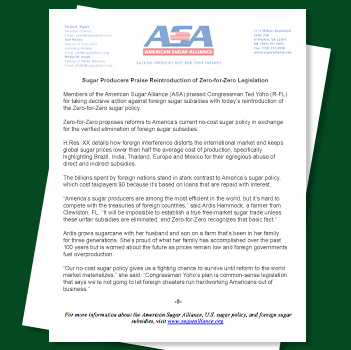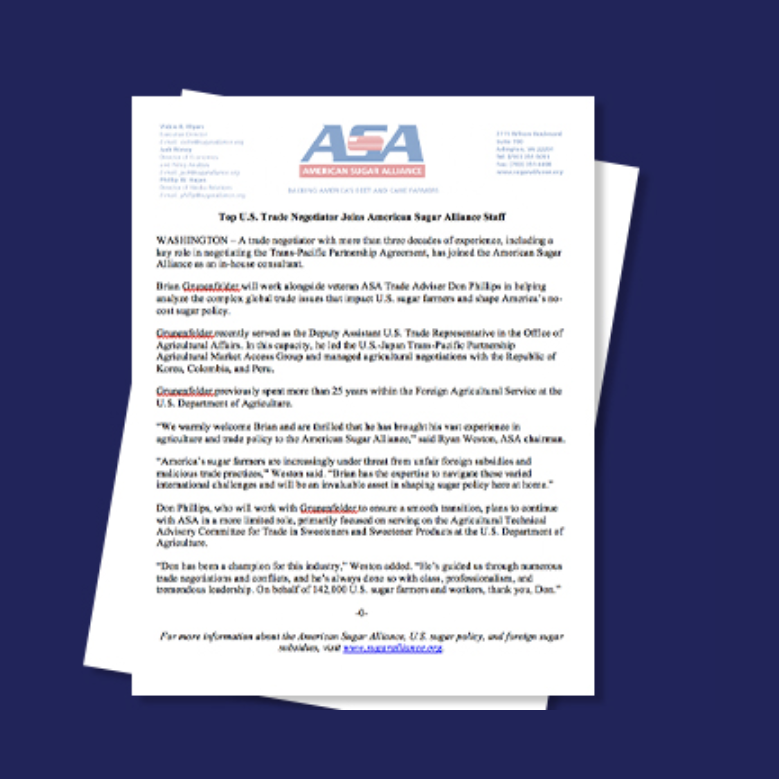Washington, D.C. – Members of Congress – including the leaders of the U.S. Senate Committee on Agriculture, Nutrition, and Forestry and the U.S. House Committee on Agriculture – reiterated their support for strong U.S. sugar policy in the upcoming Farm Bill during the 38th International Sweetener Symposium held by the American Sugar Alliance.
The 22 members of Congress included Senators Stabenow (D-MI), Boozman (R-AR), Hoeven (R-ND), Klobuchar (D-MN), Smith (D-MN), Fischer (R-NE), Scott (R-FL), and Ricketts (R-NE), and Representatives Thompson (R-PA-15), Scott (D-GA-13), Costa (D-CA-21), Craig (D-MN-02), Cammack (R-FL-03), Finstad (R-MN-01), Caraveo (D-CO-08), McCollum (D-MN-04), Hinson (R-IA-02), Smith (R-NE-03), Kildee (D-MI-08), Fischbach (R-MN-08), Carter (D-LA-02), and Armstrong (R-ND-AL).
Chairwoman of the Senate Agriculture Committee, Senator Debbie Stabenow (D-MI), noted her work to keep the sugar program strong in the 2018 Farm Bill and said, “Sugar is sweet, but its role in the economy and in communities across the country is even sweeter.” In writing the upcoming Farm Bill, she emphasized the need for “a strong coalition to defend the sugar program.”
Ranking Member of the Senate Agriculture Committee, Senator John Boozman (R-AR), shared a statement with the industry. “Sugar producers play a vital role in agriculture. I was recently in Wyoming and heard firsthand from producers in that state about some of the challenges they face. It is important to ensure the risk management tools available to producers are effective and affordable. That means investing in improvements to the farm safety net for our producers and our rural communities.”
Chairman of the House Agriculture Committee, Rep. Glenn GT Thompson (R-PA-15), said, “The sugar industry is a key player on my farm team.” He reiterated that “sugar’s impact on the agriculture industry and the overall economy is significant.” Chairman Thompson noted the challenges faced by producers over the past few years. “Our nation’s producers are stretched thin,” further highlighting “the need for a domestic food supply.” On the Farm Bill, Chairman Thompson said, “Making improvements to commodity programs and crop insurance is a key priority of mine” so that farmers have “a safety net that they can rely upon when times get tough.” “If we get this right, not only are we doing right by producers but also by taxpayers who are footing the bill.”
The Ranking Member on the House Agriculture Committee, Rep. David Scott (D-GA-13), stated his support for the sugar policy. “I strongly support the sugar program and the sustainability it provides to growers of beet and cane sugar… [Sugar policy] is designed to help level the playing field at zero cost to the Federal government.”
Ranking Member of the Senate Appropriations Subcommittee on Agriculture, Rural Development, Food and Drug Administration, and Related Agencies, and senior member of the Senate Agriculture Committee, Senator John Hoeven (R-ND), asserted, “USDA needs to always remember that U.S. sugar policy exists to help domestic sugar farmers and their processors. It is not there to boost foreign producers that dump on the global market and don’t meet the same safety and environmental standards that U.S. farmers meet every single day.” On the Farm Bill, Senator Hoeven noted he is working on “crafting the strongest Farm Bill possible for our producers” to “improve and strengthen the farm safety net.”
Senate Agriculture Committee member Senator Amy Klobuchar (D-MN) stated that “protecting the [sugar] program’s integrity is among my top priorities for the Farm Bill.” The Senator thanked sugar producers for all they do to make sure consumers and food manufacturers have reliable and responsibly grown sugar.
Chair of the Senate Agriculture Subcommittee on Commodities, Risk Management, and Trade, Senator Tina Smith (D-MN), recognized that “sugar producing and processing is a cornerstone of American agriculture.” She noted she is “pushing to ensure the core farm programs work for American producers – including protecting the sugar program.”
Senate Agriculture Committee member Senator Deb Fischer (R-NE) reiterated her support for sugar producers – especially in her state – and shared her goals for the upcoming Farm Bill. “I’m working to craft a [Farm] Bill that creates stronger safety nets, improves access to precision agriculture technologies, and improves disaster relief.”
Senator Rick Scott (R-FL) emphasized his support for this vital industry. Understanding that farmers are facing difficult times, he told the group that “there’s no time like the present” to provide relief in the Farm Bill.
Senator Pete Ricketts (R-NE) noted that “sugarbeets have played a critical role in the development of Nebraska’s panhandle” and assured the sugar industry that “ensuring the strength of our agricultural sector is essential for our economy because food security is national security. I am committed to passing a Farm Bill that reflects those priorities.”
House Agriculture Committee member and farmer Rep. Jim Costa (D-CA-21) recognized that “sugar is an important industry because food is a national security issue.” Congressman Costa said U.S. producers are the best. “We (American farmers) can compete with anyone in the world if there’s a level playing field and it’s fair.”
House Agriculture Committee member Rep. Angie Craig (D-MN-02) noted that sugar policy is a top priority for her in the Farm Bill. “As sugar farmers and producers, your work helps feed families and fuel the economy – and you deserve a Farm Bill that helps you sustain and grow your operations. That’s exactly what I’ll be fighting for this year.”
House Agriculture Committee member and farmer Rep. Kat Cammack (R-Fl-03) spoke on the importance of defending sugar policy and reminded sugar producers of what’s at stake. “We’ve got one shot every five years to hold together the most critical industry in the U.S…We have to talk about food security as national security.”
House Agriculture Committee member and farmer Rep. Brad Finstad (R-MN-01) stated his number one priority in the upcoming Farm Bill is “making sure that it is written by farmers and for farmers, by rural America for rural America. Food and farm security is national security – and defending a strong American sugar policy is critical to this equation.”
House Agriculture Committee member Rep. Yadira Caraveo (D-CO-08) gave her full support for the industry. “I’m a proud advocate for domestic sugar production on the House Agriculture Committee.” She gave thanks to “the tireless work of our sugar farmers, processors, refiners, suppliers, and workers [to feed] our families every day. It’s not only vital to our economy but our everyday life.”
House Appropriations Committee member Rep. Betty McCollum (D-MN-04) emphasized her support for Minnesota sugarbeet farmers and the overall domestic sugar industry. As a leader on the House Appropriations Committee, she is “ready to fight back against deep cuts that would harm our farmers and producers who are the backbone of our food system and help keep our economy strong.”
House Appropriations Committee member Rep. Ashley Hinson (R-IA-02) told sugar producers she is fighting to ensure the competitiveness of American producers. “Title I provides critical tools that we can use to protect food security and also the health of our rural communities…I am committed to elevating farmers’ priorities and perspectives to craft bipartisan policies.”
House Ways and Means Committee member Rep. Adrian Smith (R-NE-03) is proud of the long history of sugar production in his state, noting that “Nebraska sugarbeet production has continued to support the state and local economies thanks to your hard work.” Rep. Smith assured sugar producers that he knows the Farm Bill is of interest and his door “is always open” to hear from the industry.
House Ways and Means Committee member Rep. Dan Kildee (D-MI-08) emphasized that American sugarbeet and sugarcane farmers and related jobs are “under attack from unfair competition and foreign interests,” and Congress must maintain the sugar program to “ensure fair competition between our growers and imports from abroad.” Rep. Kildee told attendees, “I’ll continue to fight for our growers against those efforts to gut the sugar program so that we can protect the growers and jobs across America.”
House Ways and Means Committee and Rules Committee member Rep. Michelle Fischbach (R-MN-07) said, “The sugar industry is vital to the communities across my district and across the country.” The Congresswoman is proud to represent the largest sugarbeet-growing district in the nation. Rep. Fischbach assured sugar producers that she is closely tracking the Farm Bill renewal, saying she is “fighting for sugar producers and a strong suite of farm programs when the Farm Bill moves forward in the fall.”
Rep. Troy Carter (D-LA-02) said passing the Farm Bill is one of his top priorities this year. “I’m working to ensure the Farm Bill doesn’t just pass, but it has the sugar industry’s interests in mind and in the forefront.” Rep. Carter thanked the sugar industry, noting, “Not only are you supporting workers, manufacturers, and business – but you’re benefiting the American economy and people.”
Rep. Kelly Armstrong (R-ND-AL) thanked the North Dakota sugar industry for providing thousands of jobs. “The sugar industry is incredibly important – not just important to our economy [in North Dakota] but to the ag economy as a whole.” He thanked sugar producers for “keeping our food sweet and tasting fantastic.”
American Sugar Alliance Chairwoman and President of the U.S. Beet Sugar Association Cassie Bladow thanked the members of Congress for addressing the industry’s annual Symposium. “We’re encouraged by your leadership and strong support for sugar policy. Thank you for appreciating our family farmers’ role as job creators and economic drivers in urban and rural communities across the country. We’re proud of our work to keep U.S.-made sugar on grocery shelves and provide timely delivery of sugar to U.S. food manufacturers.”

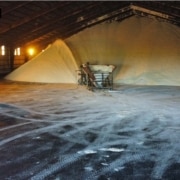
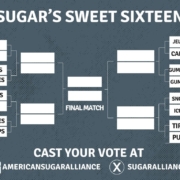



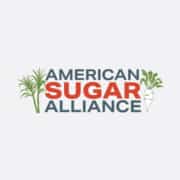
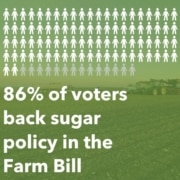



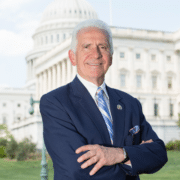
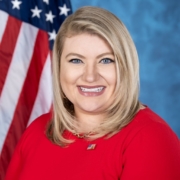
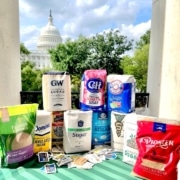

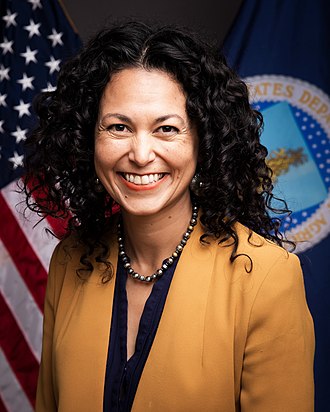 America’s sugar farmers and workers congratulate Xochitl Torres Small on her appointment as the U.S. Department of Agriculture’s Deputy Secretary.
America’s sugar farmers and workers congratulate Xochitl Torres Small on her appointment as the U.S. Department of Agriculture’s Deputy Secretary.
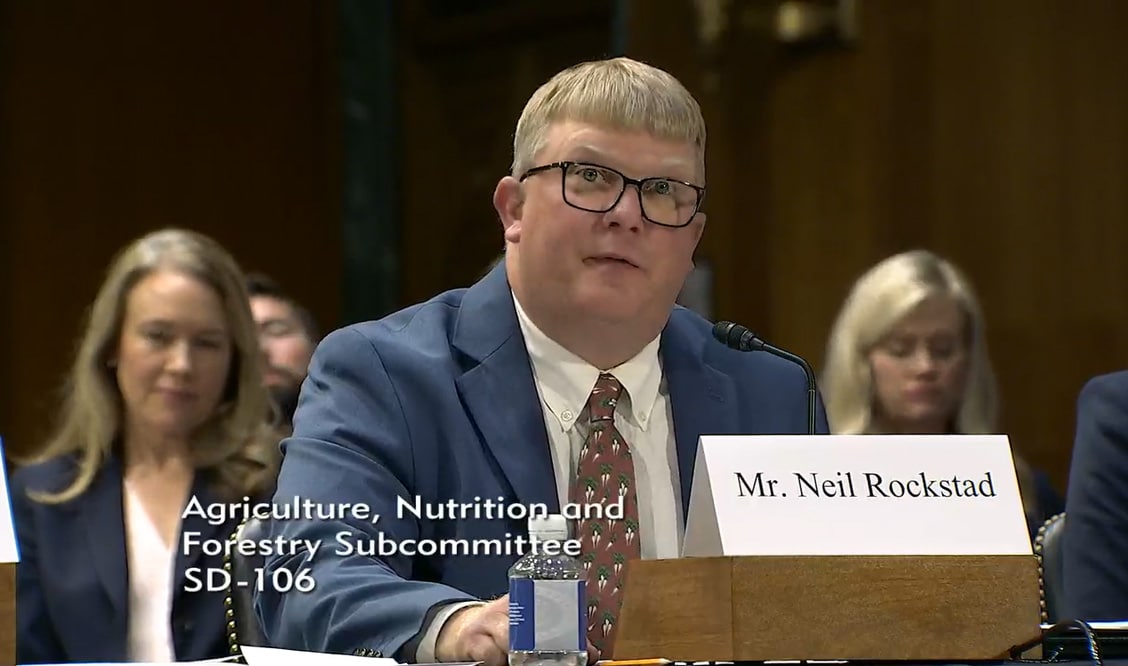





 Statement from the American Sugar Alliance on the confirmation of Doug McKalip as the U.S. Trade Representative’s (USTR) Chief Agricultural Negotiator:
Statement from the American Sugar Alliance on the confirmation of Doug McKalip as the U.S. Trade Representative’s (USTR) Chief Agricultural Negotiator:
 The American Sugar Alliance congratulates Alexis Taylor on her Senate confirmation to serve as the U.S. Department of Agriculture’s (USDA) Under Secretary for Trade and Foreign Agricultural Affairs.
The American Sugar Alliance congratulates Alexis Taylor on her Senate confirmation to serve as the U.S. Department of Agriculture’s (USDA) Under Secretary for Trade and Foreign Agricultural Affairs.
